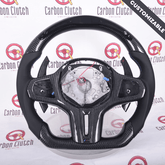Carbon Fiber Steering Wheels vs. Traditional Materials.
When it comes to choosing a steering wheel for your vehicle, there are a number of different materials to choose from, each with its own unique advantages and disadvantages. In recent years, carbon fiber has emerged as a popular material for steering wheels, offering a number of benefits over traditional materials such as leather and plastic. In this blog, we'll compare carbon fiber steering wheels with traditional materials and explore the pros and cons of each.
Carbon Fiber: Pros:
-
Lightweight: One of the biggest advantages of carbon fiber is its weight. Carbon fiber steering wheels are significantly lighter than traditional steering wheels made from materials such as leather or plastic. This reduced weight not only makes the steering wheel easier to handle, but it also improves the overall performance of the vehicle by reducing the unsprung weight.
-
Strong and Durable: Carbon fiber is a strong and durable material that can withstand high levels of stress and impact. This makes it the perfect material for steering wheels, which are subject to constant wear and tear. With a carbon fiber steering wheel, you can be sure that your steering wheel will last for years to come.
-
Improved Driving Experience: Carbon fiber steering wheels offer a more tactile and responsive driving experience. The material provides a better grip, allowing for more precise control of the vehicle. Additionally, the reduced weight of the steering wheel makes it easier to maneuver and respond to sudden movements.
-
Aesthetic Appeal: Carbon fiber has a unique and attractive appearance that sets it apart from other materials. The sleek and modern look of a carbon fiber steering wheel can add a touch of style and sophistication to your vehicle's interior.
Cons:
-
Cost: Carbon fiber is a more expensive material than traditional materials such as leather or plastic. This can make upgrading to a carbon fiber steering wheel a more costly investment.
-
Complex Manufacturing Process: The manufacturing process of carbon fiber steering wheels is more complex and time-consuming than traditional materials. This can lead to longer lead times and higher production costs.
Leather: Pros:
-
Comfort: Leather is a soft and comfortable material that provides a good grip and a pleasant feel when driving. This makes it a popular material for steering wheels, especially in luxury vehicles.
-
Aesthetic Appeal: Leather has a classic and sophisticated appearance that adds a touch of style to the vehicle's interior.
Cons:
-
Cost: Leather is a more expensive material than plastic and can add to the overall cost of the vehicle.
-
Maintenance: Leather requires regular maintenance and conditioning to keep it looking its best. This can be time-consuming and costly.
-
Durability: Leather is a soft material that can wear and tear over time, especially with exposure to sunlight, heat, and moisture. This can lead to cracking and fading, reducing the overall lifespan of the steering wheel.
Plastic: Pros:
-
Cost: Plastic is a less expensive material than leather or carbon fiber, making it a popular choice for budget-conscious buyers.
-
Easy to Manufacture: Plastic is a lightweight and flexible material that is easy to mold into the desired shape. This makes it a cost-effective material for steering wheels.
Cons:
-
Aesthetic Appeal: Plastic has a less attractive appearance than leather or carbon fiber and can detract from the overall style of the vehicle's interior.
-
Durability: Plastic is a less durable material than leather or carbon fiber and can crack or break under stress.
In conclusion, each material has its own unique advantages and disadvantages, and the best choice will depend on your individual needs and preferences. Carbon fiber steering wheels offer improved performance, durability,








